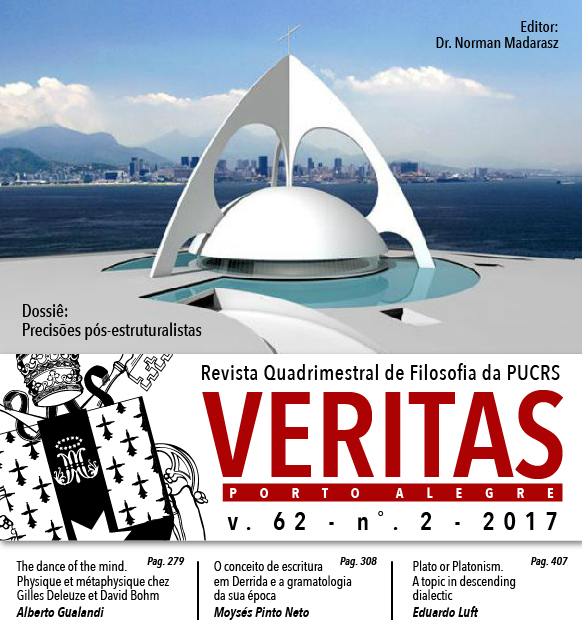Plato or Platonism. A topic in descending dialectic
DOI:
https://doi.org/10.15448/10.15448/1984-6746.2017.2.27451Keywords:
Plato, Platonism, Hegel, dialectical ontology, network ontology.Abstract
Dialectical ontology can be reconstructed following two complementary paths1. The ascending path (anabasis) begins with the influence of Plato’s ontology through Nicholas of Cusa on Bertalanffy2, the founder of systems theory. Converging with Darwinism, this theoretical approach will give rise to the more refined version of the complex adaptive systems theory, and will ultimately spread out through the different sciences, converting from a regional ontology (ontology of biology) into a major part of a new general ontology (theory of being as being, that obviously should not be understood here as a merely formal ontology3). The descending path (katabasis), the eminently philosophical one, also has two branches which ultimately converge: on the one hand it leads from Plato’s theory of ideas to German idealism and seeks to establish itself by immanent critique of Hegel’s system (a topic that has for a long time been my main occupation4); the second branch of this descending dialectic is the subject of this essay, namely, the investigation of the decisive role of self-critical development of Plato’s philosophy in the project of a deflationary relational ontology or, simply, a network ontology.
Downloads
References
Almeida , Custódio Luís Silva de. Hermenêutica e Dialética: dos Estudos Platônicos ao Encontro com Hegel. Porto Alegre: Edipucrs, 2002.
Aristotle. Metaphysics [Met]. Trans. by W. D. Ross. In: The Internet Classics Archive. <http://classics.mit.edu/Aristotle/metaphysics.html>. Accessed 15 May 2017.
Barabási, A.-L. Network Science. Network Science Book. 2012.<http://barabasi.com/networksciencebook>. Accessed 15 May 2017.
Beinhocker, Eric. Origins of Wealth: Evolution, Complexity and the Radical Reshaping of Economics. Boston: Harvard Business School Press, 2006.
Bubner, Rüdiger. Dialektik als Topik: Bausteine zu einer lebensweltlichen Theorie der Rationalität. Frankfurt am Main: Suhrkamp, 1990.
Cabrera, Julio. "Lógica y dialéctica: lecturas oblicuas". In: Cirne. Sistema e objeções. Edited by Adriano Naves de Brito. São Leopoldo: Editora Unisinos, 2009. p. 39-71.
Cirne-Lima, Carlos. Beyond Hegel. A Critical Reconstruction of the Neoplatonic System. 2006. <http://carloscirnelima.org>. Accessed 15 May 2017.
______. Dialética para principiantes. Porto Alegre: Edipucrs, 1996.
______. Sobre a contradição. Porto Alegre: Edipucrs, 1993.
Conche, M. Orientation philosophique. Paris: Presses Universitaires de France, 1990.
Dostal , Robert J. "Time and Phenomenology in Husserl and Heidegger". In: The Cambridge Companion to Heidegger. Edited by Charles B. Guignon. Cambridge: Cambridge University Press, 1993. p. 141-169. DOI: https://doi.org/10.1017/CCOL0521385709.006
Gadamer , Hans-Georg. Gesammelte Werke [GW]. Tübingen: Mohr, 1990.
Gaiser, Konrad. Platons ungeschriebene Lehre. Studien zur systematischen und geschichtlichen Begründung der Wissenschaften in der Platonischen Schule. 3. ed. Stuttgart: Klett-Cotta, 1998.
Hegel, Georg Wilhelm Friedrich. "Wissenschaft der Logik [WL]". In: Werke in 20 Bänden. Edited by Eva Moldenhauer and Karl M Michel. 2. ed. Vol. 5, 6. Frankfurt am Main: Suhrkamp, 1990.
______. "Enzyklopädie Der Philosophischen Wissenschaften [Enz]." In: Werke in 20 Bänden. Edited by Eva Moldenhauer and Karl Markus Michel. Vol. 8, 9, 10. Frankfurt am Main: Suhrkamp, 1989.
Kauffman , Stuart A. The Origins of Order. Self-Organization and Selection in Evolution. Vol. 26. 6. New York: Oxford University Press, 1993.
Lima Vaz, Henrique C. de. "Um Novo Platão?" Síntese Nova Fase, 50 (1990), p. 101-113.
Linnebo , Øystein. "Platonism in the Philosophy of Mathematics". The Stanford Encyclopedia of Philosophy. Winter 2013.
<https://plato.stanford.edu/ entries/platonism-mathematics>. Accessed 15 May 2017.
Luft, Eduardo. "Hegel’s Science of Logic as Metalogic". Kritisches Journal 2.0, 1 (2015), p. 44-59.
______. "Dialectic and Network Ontology. The Concept of Reason after Hegel". In: Los Aportes del Itinerario Intelectual de Kant a Hegel. Edited by Héctor Ferreiro, Thomas Sören Hoffmann, and Agemir Bavaresco. Porto Alegre: Edipucrs/Editora Fi, 2014a. p. 946-978.
______. "Platão ou Platonismo: um tópico em dialética descendente". In: Hermenêutica e dialética: entre Gadamer e Platão. Edited by Luiz Rohden. São Paulo: Loyola, 2014b. p. 65-90.
______. As sementes da dúvida. Investigação crítica dos fundamentos da Filosofia Hegeliana. São Paulo: Mandarim, 2001.
______. "Contradição e dialética". Síntese Nova Fase, 23, 75 (1996), p. 455-500.
Luft, Eduardo; Cirne-Lima, Carlos. Ideia e Movimento. Rio de Janeiro: Civilização Brasileira, 2012.
Oliveira, M. A. de. Dialética hoje. Lógica, Metafísica e Historicidade. São Paulo: Loyola, 2004.
Plato . Complete Works. Edited by John Madison Cooper. Translated by Dorothea Frede. Indianapolis/Cambridge: Hackett, 1997.
Platon . Sämtliche Werke in Zehn Bänden [SW]. Edited by Karlheinz Hülser. Frankfurt am Main/Leipzig: Insel, 1991.
Reale, Giovanni. História da filosofia antiga. Translated by Henrique C. de Lima Vaz and Marcelo Perine. Vol. I-V. São Paulo: Loyola, 1994.
Rohden, Luiz. O poder da linguagem. A arte retórica de Aristóteles. Porto Alegre: Edipucrs, 1997.
Ross, William David. Plato’s Theory of Ideas. Oxford: Clarendon Press, 1951.
Sextus Empiricus. Against the Logicians. Translated by R. G. Bury. Vol. I, II (Loeb). Cambridge: Harvard University Press, 1997.
Smolin, Lee. 1997. The Life of the Cosmos. New York: Oxford University Press.
Solé, R. V.; Corominas-Murtra , B.; Valverde , S.; Steels, L. "Language Networks: Their Structure, Function and Evolution". Complexity, 15, 6 (2010), p. 20-26. DOI: https://doi.org/10.1002/cplx.20305
Theunissen , Michael. Sein und Schein. Die kritische Funktion der Hegelschen Logik. 2. ed. Frankfurt am Main: Suhrkamp, 1994.
Vogel , C. J. de. "On the Neoplatonic Character of Platonism and the Platonic Character of Neoplatonism". Mind, 62 (1953), p. 43-64. DOI: https://doi.org/10.1093/mind/LXII.245.43
Downloads
Published
How to Cite
Issue
Section
License
Copyright
The submission of originals to Revista Veritas implies the transfer by the authors of the right for publication. Authors retain copyright and grant the journal right of first publication. If the authors wish to include the same data into another publication, they must cite Revista Veritas as the site of original publication.
Creative Commons License
Except where otherwise specified, material published in this journal is licensed under a Creative Commons Attribution 4.0 International license, which allows unrestricted use, distribution and reproduction in any medium, provided the original publication is correctly cited. Copyright: © 2006-2020 EDIPUCRS</p






